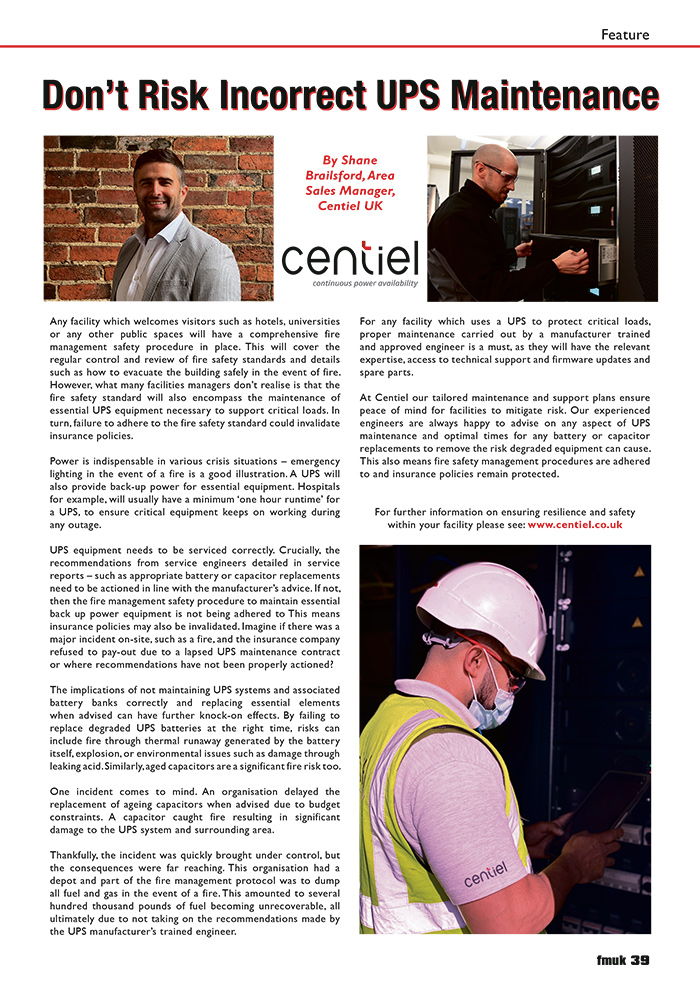Don’t Risk Incorrect UPS Maintenance

By Shane Brailsford, Area Sales Manager, Centiel UK
Any facility which welcomes visitors such as hotels, universities or any other public spaces will have a comprehensive fire management safety procedure in place. This will cover the regular control and review of fire safety standards and details such as how to evacuate the building safely in the event of fire. However, what many facilities managers don’t realise is that the fire safety standard will also encompass the maintenance of essential UPS equipment necessary to support critical loads. In turn, failure to adhere to the fire safety standard could invalidate insurance policies.
Power is indispensable in various crisis situations – emergency lighting in the event of a fire is a good illustration. A UPS will also provide back-up power for essential equipment. Hospitals for example, will usually have a minimum ‘one hour runtime’ for a UPS, to ensure critical equipment keeps on working during any outage.
UPS equipment needs to be serviced correctly. Crucially, the recommendations from service engineers detailed in service reports – such as appropriate battery or capacitor replacements need to be actioned in line with the manufacturer’s advice. If not, then the fire management safety procedure to maintain essential back up power equipment is not being adhered to This means insurance policies may also be invalidated. Imagine if there was a major incident on-site, such as a fire, and the insurance company refused to pay-out due to a lapsed UPS maintenance contract or where recommendations have not been properly actioned?
 The implications of not maintaining UPS systems and associated battery banks correctly and replacing essential elements when advised can have further knock-on effects. By failing to replace degraded UPS batteries at the right time, risks can include fire through thermal runaway generated by the battery itself, explosion, or environmental issues such as damage through leaking acid. Similarly, aged capacitors are a significant fire risk too.
The implications of not maintaining UPS systems and associated battery banks correctly and replacing essential elements when advised can have further knock-on effects. By failing to replace degraded UPS batteries at the right time, risks can include fire through thermal runaway generated by the battery itself, explosion, or environmental issues such as damage through leaking acid. Similarly, aged capacitors are a significant fire risk too.
One incident comes to mind. An organisation delayed the replacement of ageing capacitors when advised due to budget constraints. A capacitor caught fire resulting in significant damage to the UPS system and surrounding area.
Thankfully, the incident was quickly brought under control, but the consequences were far reaching. This organisation had a depot and part of the fire management protocol was to dump all fuel and gas in the event of a fire. This amounted to several hundred thousand pounds of fuel becoming unrecoverable, all ultimately due to not taking on the recommendations made by the UPS manufacturer’s trained engineer.
For any facility which uses a UPS to protect critical loads, proper maintenance carried out by a manufacturer trained and approved engineer is a must, as they will have the relevant expertise, access to technical support and firmware updates and spare parts.
At Centiel our tailored maintenance and support plans ensure peace of mind for facilities to mitigate risk. Our experienced engineers are always happy to advise on any aspect of UPS maintenance and optimal times for any battery or capacitor replacements to remove the risk degraded equipment can cause. This also means fire safety management procedures are adhered to and insurance policies remain protected.
For further information please see: www.centiel.co.uk


























































